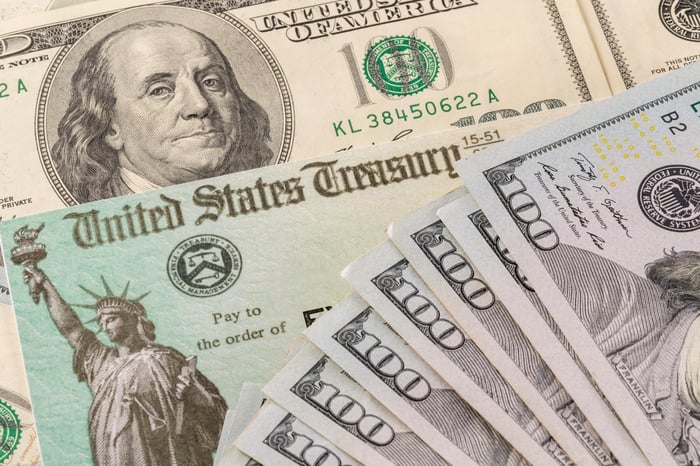For more than 160 million Americans, it's that dreaded time of the year again: Tax season.
Last year, more than 169 million people filed their taxes with the Internal Revenue Service (IRS). Amazingly, almost 130 million of these filers received a refund averaging $2,815. In 2022, federal refund amounts could be even higher.
According to IRS tax-filing data through Feb. 25, 43.8 million tax returns have been processed by the IRS, with 29.7 million refunds issued. Thus far, the average refund has come in at an eye-popping $3,473. For filers who need to build up their emergency fund or pay down debt, this is a healthy sum to do so.

Image source: Getty Images.
But for people who won't need to pay bills or set aside cash for emergencies, an average tax refund of $3,473 can go a long way over an extended period of time when invested in the stock market. It's an especially good time to invest with the market undergoing its steepest correction in two years.
If you've received or are expecting to receive a tax refund, buying these unstoppable stocks would be a smart move.
CrowdStrike Holdings
The first stock to strongly consider buying with your tax refund is cybersecurity company CrowdStrike Holdings (CRWD -1.60%).
Over the past two decades, cybersecurity has become a basic need service. No matter the size of the business, if it has an online and/or cloud-based presence, cybersecurity solutions are needed to protect sensitive data. This makes cybersecurity solution providers virtually impervious to economic contractions and recessions.
What makes CrowdStrike so special is the company's Falcon platform. Falcon is a cloud-native endpoint security platform that's reliant on artificial intelligence (AI). In English, this means the platform was specifically built within the cloud to rapidly respond to threats. With Falcon overseeing approximately 1 trillion events daily, its AI ties allow it to become more adept at recognizing these threats over time. With a customer retention rate consistently in the 98% range, it's plainly evident that Falcon is doing its job well.
Although businesses of all sizes were steadily moving their data into the cloud prior to the pandemic, this shift has accelerated in its wake. In less than five years, CrowdStrike has seen its total subscribing customer count rise from 450 to nearly 14,700.
What's arguably even more impressive is how much more existing subscribers are willing to spend. Less than five years ago, just 9% of its clients had purchased four or more cloud-module subscriptions. As of the end of October, this figure stood at 68%. Because cybersecurity software-as-a-service boasts such incredible margins, the company has already met its long-term adjusted gross margin target despite still being in the early stages of its expansion.
In short, CrowdStrike is the premier name to own in the sustainably fast-growing cybersecurity space.

Image source: Getty Images.
NextEra Energy
Another unstoppable stock that would be a wise place for value investors to put their tax refund to work is electric utility stock NextEra Energy (NEE -0.75%).
The beauty of electric utilities is they offer a basic necessity service. If you own or rent a home, you almost assuredly need electricity to power the appliances and lights in your residence. Since electricity demand doesn't fluctuate much from one year to the next, operating cash flow for electric utilities tends to be highly predictable -- and Wall Street loves predictability.
However, NextEra Energy isn't your run-of-the-mill electric utility. That's because no utility in the country is generating more capacity from solar or wind power. NextEra is highly unlikely to be dethroned as the king of green energy among electric utilities given its proposed aggregate spending on new infrastructure of $50 billion to $55 billion between 2020 and 2022.
Admittedly, investing in renewable energy projects isn't cheap. But the company has benefited from historically low lending rates, which have allowed it to finance green-energy projects at an attractive cost. The end result is substantially lower electricity generation costs that have propelled its annual growth rate to the high single digits. Comparatively, most electric utilities grow by a low single-digit rate.
Keep in mind that NextEra also has regulated utility operations (i.e., those not powered by renewable energy). Although the company can't hike rates without the approval of state public utility commissions, this regulation ensures NextEra won't face the uncertainties tied to wholesale electricity pricing.
NextEra has produced a positive total return in 19 of the past 20 years, making it an excellent choice for patient investors.

Image source: Getty Images.
Broadcom
A third unstoppable stock that blends growth and value and would be perfect for people to buy with their tax refund is semiconductor solutions provider Broadcom (AVGO 2.21%).
Unlike electric utilities, semiconductor companies are cyclical. This is a fancy way of saying that they perform their best when the U.S. and global economy are expanding, and may struggle during recessions. What's important to understand is that periods of expansion last substantially longer than contractions or recessions. In other words, patience has paid off handsomely for shareholders in Broadcom as the U.S. and global economy, and semiconductor needs, have expanded over time.
More specific to Broadcom, it has two core catalysts that could send shares steadily higher.
To begin with, the ongoing rollout of 5G wireless infrastructure is a boon to its business. In the neighborhood of three-quarters of the company's sales are derived from next-gen wireless chips and assorted components used in smartphones. Since wireless download speeds haven't been meaningfully improved in a decade, the rollout of 5G should encourage a device replacement cycle that could last for years.
The other positive for Broadcom comes from demand growth in all of its other ancillary ventures. For example, the company should see fairly steady demand increases from data centers and the automotive industry.
It's also plainly evident that Broadcom won't be seeing a slowdown in chip demand anytime soon. Last year, the company's backlog increased to $14.9 billion (a 15% increase from 2020). What's more, CEO Hock Tan noted in March of last year that 90% of the company's 2021 chip supply had already been booked. This order front-running has shown no signs of slowing over the past year.
With one of the fastest-growing dividends in the tech space, Broadcom is a no-brainer buy for folks expecting a tax refund.





